Once upon a time, comics weren't considered "real" literature. Eternal gratitude for breaking that literary ceiling goes to Art Spiegelman, whose Maus (Pantheon, $25) won a Pulitzer in 1992, and to Gene Luen Yang, whose American Born Chinese (First Second, $14.99) was a 2006 National Book Award finalist. Nowadays, manga (Japan), manhwa (Korea), and manhua (China) continue to dominate the graphic market, and notable titles abound!
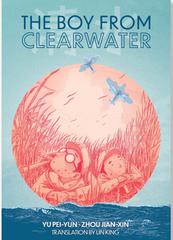 An extraordinary triumvirate--writer Pei-Yun Yu, artist Jian-Xin Zhou, and translator Lin King--present The Boy from Clearwater in two volumes (Levine Querido, $19.99 each). Exquisite art captures nonagenarian Tshua Khun-lim's remarkable life, defined by his unjust 10-year imprisonment during Taiwan's vicious White Terror (1947-1987). Book 1 consists of Part 1 (his idyllic childhood) and Part 2 (his brutal, unwarranted 10-year incarceration for joining a school book club). Book 2 collects Part 3 (his release and reentry into society) and Part 4 (another fresh start). The creative trio bears glorious witness to little-known tragic history by spotlighting an everyday superhero who survived--and thrives.
An extraordinary triumvirate--writer Pei-Yun Yu, artist Jian-Xin Zhou, and translator Lin King--present The Boy from Clearwater in two volumes (Levine Querido, $19.99 each). Exquisite art captures nonagenarian Tshua Khun-lim's remarkable life, defined by his unjust 10-year imprisonment during Taiwan's vicious White Terror (1947-1987). Book 1 consists of Part 1 (his idyllic childhood) and Part 2 (his brutal, unwarranted 10-year incarceration for joining a school book club). Book 2 collects Part 3 (his release and reentry into society) and Part 4 (another fresh start). The creative trio bears glorious witness to little-known tragic history by spotlighting an everyday superhero who survived--and thrives.
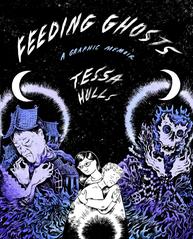 Artist/writer/adventurer Tessa Hulls presents Feeding Ghosts (MCD, $40), her complex debut memoir. Its 400 haunting, intricately drawn, densely filled black-and-white pages explore (and expose) mental illness, dysfunctional bonds, inherited trauma across three generations. In 2015, after decades of running from her "family's darkness," Hulls "embarked on an expedition into [her] family's past," set against a backdrop of Chinese history and immigrant diaspora. To understand her own story, Hulls began with "three paltry grandmother facts": "China, writer, madness." Her intimate, harrowing journey captures "three women who have crossed so many oceans, trying to carry each other home."
Artist/writer/adventurer Tessa Hulls presents Feeding Ghosts (MCD, $40), her complex debut memoir. Its 400 haunting, intricately drawn, densely filled black-and-white pages explore (and expose) mental illness, dysfunctional bonds, inherited trauma across three generations. In 2015, after decades of running from her "family's darkness," Hulls "embarked on an expedition into [her] family's past," set against a backdrop of Chinese history and immigrant diaspora. To understand her own story, Hulls began with "three paltry grandmother facts": "China, writer, madness." Her intimate, harrowing journey captures "three women who have crossed so many oceans, trying to carry each other home."
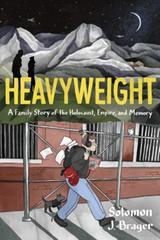
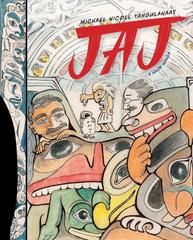 Artist, author, and activist Michael Nicoll Yahgulanaas began melding traditional North Pacific Indigenous iconography and modern Asian artistic influences in the late-1990s to create "Haida Manga." He returns to his spectacular hybrid artistry in JAJ (Douglas & McIntyre, $29.95) to brilliantly interrogate first contact between Europeans and the Indigenous people of his ancestral home, Canada's Haida Gwaii archipelago. JAJ has two meanings: "(1) one who decides (Hindi), (2) Johan Adrian Jacobsen." Both are haunting references: the deciders are invading Europeans, among them adventurer and ethnographer Jacobsen. Also remarkable is the ability to deconstruct and reassemble these pages into a stunning single image.
Artist, author, and activist Michael Nicoll Yahgulanaas began melding traditional North Pacific Indigenous iconography and modern Asian artistic influences in the late-1990s to create "Haida Manga." He returns to his spectacular hybrid artistry in JAJ (Douglas & McIntyre, $29.95) to brilliantly interrogate first contact between Europeans and the Indigenous people of his ancestral home, Canada's Haida Gwaii archipelago. JAJ has two meanings: "(1) one who decides (Hindi), (2) Johan Adrian Jacobsen." Both are haunting references: the deciders are invading Europeans, among them adventurer and ethnographer Jacobsen. Also remarkable is the ability to deconstruct and reassemble these pages into a stunning single image.
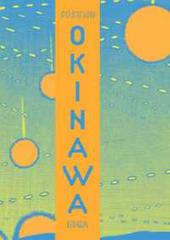
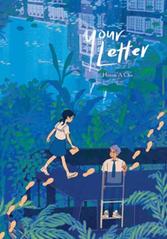 Hyeon A. Cho's magical manhwa Your Letter (Yen/Ize, $20), begins with a too-recognizable scene of intense bullying. When Sori "quit being a bystander," she became the next pariah. Her transfer to a new school is initially daunting until she discovers the first letter taped under her desk. The first leads to a second and more, inspiring wondrous adventures, vital friendships, and a serendipitous surprise at book's end. In full-color, vibrantly expressive panels, Cho enchantingly transforms that somber opening into joyful beginnings.
Hyeon A. Cho's magical manhwa Your Letter (Yen/Ize, $20), begins with a too-recognizable scene of intense bullying. When Sori "quit being a bystander," she became the next pariah. Her transfer to a new school is initially daunting until she discovers the first letter taped under her desk. The first leads to a second and more, inspiring wondrous adventures, vital friendships, and a serendipitous surprise at book's end. In full-color, vibrantly expressive panels, Cho enchantingly transforms that somber opening into joyful beginnings.
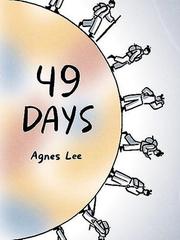 Finally, fans of the New York Times' "Metropolitan Diary" will likely recognize artist Agnes Lee's minimalist, often whimsical illustrations in her debut novel, 49 Days (Levine Querido, $18.99), an evocative, mystical creation with little text, overflowing with unsaid feelings. Lee begins with a wordless spread marked "Day 1" on the left, an empty beach on the right. A backpack-wearing girl appears in constant motion, checking her watch, occasionally cursing. Days pass. Blues overlaid on black-and-white panels get replaced with brown, signaling flashbacks to youthful memories; panels tinged in sienna reveal a parallel narrative of a family in mourning. Gently, nudgingly, Lee intertwines past, present, and future over 49 days. --Terry Hong
Finally, fans of the New York Times' "Metropolitan Diary" will likely recognize artist Agnes Lee's minimalist, often whimsical illustrations in her debut novel, 49 Days (Levine Querido, $18.99), an evocative, mystical creation with little text, overflowing with unsaid feelings. Lee begins with a wordless spread marked "Day 1" on the left, an empty beach on the right. A backpack-wearing girl appears in constant motion, checking her watch, occasionally cursing. Days pass. Blues overlaid on black-and-white panels get replaced with brown, signaling flashbacks to youthful memories; panels tinged in sienna reveal a parallel narrative of a family in mourning. Gently, nudgingly, Lee intertwines past, present, and future over 49 days. --Terry Hong

